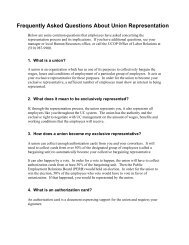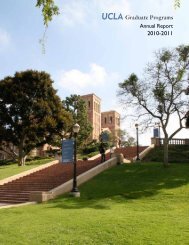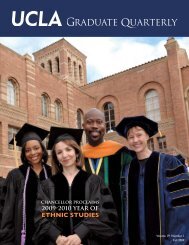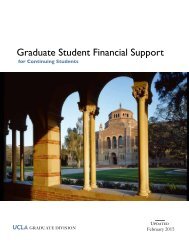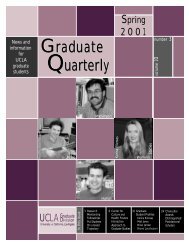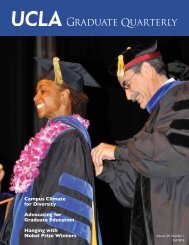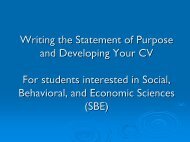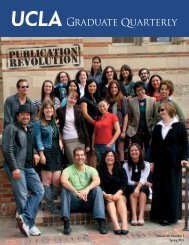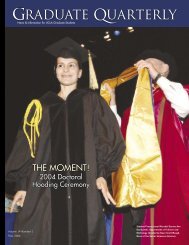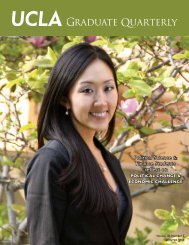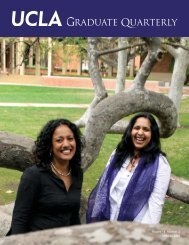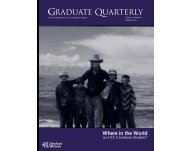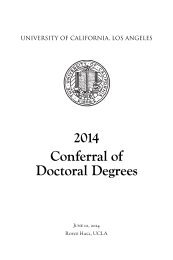Graduate Quarterly - Winter 2008 - UCLA Graduate Division
Graduate Quarterly - Winter 2008 - UCLA Graduate Division
Graduate Quarterly - Winter 2008 - UCLA Graduate Division
You also want an ePaper? Increase the reach of your titles
YUMPU automatically turns print PDFs into web optimized ePapers that Google loves.
“I always had programs and people in my life—<br />
teachers and family—to help provide support,”<br />
he says. “I didn’t get here by myself.”<br />
His passionate commitment to this belief<br />
is at the center of his life these days. As a graduate<br />
student in education, he is developing a<br />
Black Male Youth Academy curriculum that<br />
“uses the school structure to help students<br />
develop a positive identity and to achieve<br />
academically and socially.” In addition, his<br />
work with the African Student Union at<br />
<strong>UCLA</strong> and his links to other campuses won<br />
him appointment as a student member of the<br />
UC Board of Regents, where he can speak on<br />
behalf of greater access and affordability for<br />
traditionally underrepresented students. And<br />
at a personal level, he is the father of a small<br />
boy. Today’s trends suggest the youngster<br />
“has a greater chance of going to prison than<br />
going to college,” D’Artagnan says. “That’s<br />
not acceptable to me.”<br />
He also knows, at a personal level, that<br />
a person can grow up in an environment of<br />
poverty and still “come to school and take<br />
advantage of the educational opportunities<br />
available.” Raised in Watts, his father a drug<br />
addict who was never home and his mother<br />
struggling to raise two children alone on a<br />
clerk’s wages, D’Artagnan nevertheless excelled<br />
in school. “I always had programs and<br />
people in my life—teachers and family—to<br />
help provide support,” he says. “I didn’t get<br />
here by myself.”<br />
Although D’Artagnan recalls being interested<br />
in social justice as early as second or<br />
third grade, a major turning point occurred<br />
when he visited South Africa in 2001 as<br />
part of a travel abroad program led by History<br />
Professor William Worger. “I stood in<br />
Nelson Mandela’s cell, which was a powerful<br />
experience for me,” he says. Seeing poverty in<br />
South Africa, he understood that what he had<br />
experienced in Watts “was nothing compared<br />
to what they experience over there.” As a<br />
result, he “came back with a stronger desire<br />
to make an impact on the world.”<br />
The direction that impact would take<br />
was influenced by the events of September<br />
11, 2001. He “saw the smoke from the<br />
towers all the way down in South Jersey,”<br />
he says, where he was living with his new<br />
wife and their son. His wife was in the Navy,<br />
and he soon joined, too, believing that “this<br />
is where I can go to have an impact right<br />
now,” he says. D’Artagnan served for more<br />
than four years, including a tour in Iraq<br />
where he helped to set up and operate a support<br />
unit for naval personnel in the region.<br />
Although his assignment kept him “as safe<br />
as I could be in a war zone,” D’Artagnan<br />
nonetheless “knew that I could die at any<br />
moment,” he says. “That lesson wasn’t lost<br />
on me. That’s what drove my motivation<br />
when I got back.”<br />
He quickly returned to <strong>UCLA</strong>, completing<br />
a bachelor’s degree in little more<br />
than a year. Looking for a new way to make<br />
an impact, he joined the African Student<br />
Union, working on issues related to admissions,<br />
campus climate, and academic<br />
preparation—in short “how to make the<br />
university more affordable and more accessible<br />
for people who traditionally don’t attend.”<br />
Soon extending his activities beyond<br />
<strong>UCLA</strong>, “I had a much better grasp of what<br />
happens throughout the entire system,” he<br />
says, and sought to shape policies and “the<br />
conversation on larger issues.”<br />
His appointment as a student regent is<br />
like “a crash course in higher education,” he<br />
says. “You can’t get better training.” Professor<br />
Worger, who led the trip to South Africa,<br />
has “indelible memories” of D’Artagnan<br />
“constantly debating/questioning arguing<br />
with everyone on the trip about issues ranging<br />
from the causes of inequity in contemporary<br />
South Africa to the pros and cons of<br />
marriage.” Professor Worger believes “the<br />
university, the system, and the Regents will<br />
benefit immeasurably from his enthusiasm,<br />
energy, and insights.”<br />
Some of that enthusiasm and energy,<br />
however, will be reserved for an action<br />
research project he’s pioneering at a high<br />
school in Inglewood. As an undergraduate<br />
McNair Research Scholar last year,<br />
D’Artagnan had a class period twice a week<br />
with a group of two dozen or so black male<br />
students, teaching them the social and<br />
cultural history of African Americans and<br />
working to develop their “leadership skills,<br />
education goals, and personal pride.”<br />
Thanks to positive results, he will have<br />
a homeroom class each school day at the<br />
same location this year, and he’s developing<br />
a curriculum that will allow others<br />
to replicate his program in other settings.<br />
That work will probably form the core of his<br />
doctoral research under Associate Professor<br />
of Education Ernest D. Morrell. His graduate<br />
coursework is helping him to enrich his<br />
database and enhance his analysis.<br />
All of this background, he hopes, will<br />
prepare him for a leadership role in California<br />
schools, where he can make “much<br />
larger educational changes,” but still working<br />
toward the goal that moves him now:<br />
helping more people from backgrounds like<br />
his to take advantage of the opportunities<br />
he continues to explore.<br />
<strong>Winter</strong> <strong>2008</strong> GRADUATE QUARTERLY<br />
23



